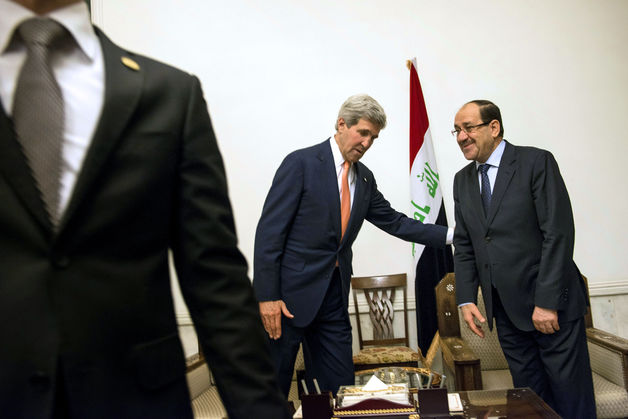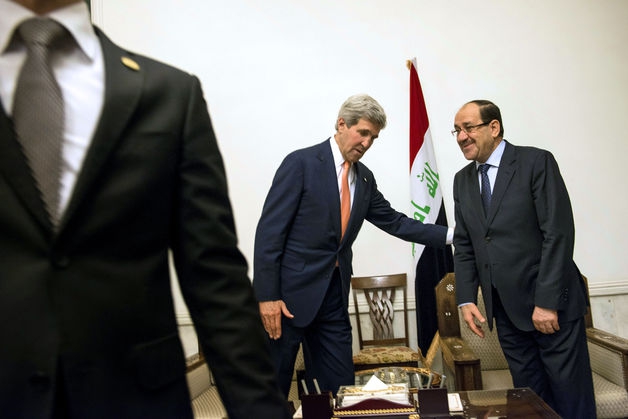 Iraqi Prime Minister Nuri al-Maliki and U.S. Secretary of State John Kerry meet at the Prime Minister's Office in Baghdad on June 23, 2014.[/caption]
Iraqi Prime Minister Nuri al-Maliki and U.S. Secretary of State John Kerry meet at the Prime Minister's Office in Baghdad on June 23, 2014.[/caption]U.S. Secretary of State�John Kerry�pulled support from Iraq�s Prime Minister�Nouri al-Maliki�today, telling him not to hinder the political process amid reports that Islamic State militants had seized a town northeast of Baghdad.
Kerry said that the U.S. was backing Iraq�s President�Fouad Masoum�and that Maliki wasn�t even among the three candidates Iraqis wanted as the next prime minister.
�We stand absolutely, squarely behind President��Fouad Masoum, Kerry said in Sydney. �He has the responsibility for upholding the constitution of Iraq, he is the elected president, at this moment Iraq has clearly made a statement that they are looking for change.�
Political haggling in Iraq is hurting government attempts to curb advances by an al-Qaeda breakaway group that ravaged the north of the country and drew U.S. air strikes. U.S. President�Barack Obama�has said that greater U.S. assistance in pushing back Islamic State forces would only come if a more inclusive government was formed that didn�t marginalize Sunni and other minorities.
While U.S. strikes have slowed Islamic State advances in the north, the group still holds vast swaths of territory in Syria and Iraq, including key installations such as dams, military outposts and Iraq�s biggest northern city.
Kurdish forces on Sunday were able to retake the towns of Makhmour and Gwer, south of Erbil, where militants retreated after U.S. airstrikes, according to the Kurdish news agency Rudaw, citing officials
Yezidi Rescue
About 20,000 Yezidi Iraqis who had been trapped in a mountainous region were rescued and taken to an area in Kurdish control, CNN reported, citing Iraqi Ministry of Human Rights spokesman Kamil Amin. Still, the militant group advanced elsewhere and took the town of Jalawla, northeast of Baghdad, Al Arabiya television reported.
Al-Maliki has so far ignored the U.S. pleas to go quietly and overnight deployed troops on the streets of Baghdad, many concentrated around the Green Zone, where government buildings and the U.S. embassy are located, eyewitnesses said. The move came after parliament adjourned without progress on a new prime minister after inconclusive elections in April. Maliki said he plans to sueMasoum�in federal court for violating the constitution in part by extending the period for choosing the next prime minister.
�Among the Shia it is very very evident that they have three candidates or so for prime minister, none of whom are Mr. Maliki,� Kerry said. �So what we urge the people of Iraq to do is to be calm. There should be no use of force, no introduction of troops or militias into this moment of democracy for Iraq.�
 Photographer: Sabah Arar/AFP via Getty Images
Photographer: Sabah Arar/AFP via Getty ImagesIraqi security forces patrol a street in Baghdad's commercial district of Karrada on Aug. 11, 2014.
Show of Force
Maliki�s show of force came after he defied efforts by lawmakers to pressure him to drop his bid for a third term. There was a heavy presence of security forces stationed outside Masoum�s home, Al Arabiya reported.
Kerry said the government formation process was critical for stability and calm.
�Our hope is that Mr. Maliki will not stir those waters,� he said. �One thing all Iraqis need to know: there will be little international support of any kind whatsoever for anything that deviates from the legitimate constitutional process that is in place and being worked on now.�
Maliki is facing accusations by Kurdish and Sunni politicians, as well as by some former Shiite allies, that he leads a divisive, sectarian government that has fueled support for the Islamic State.
Less Good Choices
�Every day that passes strengthens Nouri al-Maliki�s hand,� said�Kenneth Pollack, a senior fellow in the Center for Middle East Policy at the Brookings Institution in Washington. �His game is to drag things out and demonstrate that nobody else can be prime minister.�
 Photographer: Sabah Arar/AFP via Getty Images
Photographer: Sabah Arar/AFP via Getty ImagesIraqi army armoured vehicles patrol a street in Baghdad's commercial district of Karrada on Aug 11, 2014.
If the U.S. won�t conduct more aggressive attacks against the militants until a new government is functioning, �then the civil war rages on,� Pollack said. �The president will have less good choices.�
In authorizing air strikes on Aug. 7, Obama limited the air campaign to two purposes: protecting U.S. personnel in northern Iraq and preventing the mass slaughter of civilians.
In the latest round of strikes yesterday, the U.S. came to the aid of Kurdish forces near Erbil, the regional capital. Using fighter jets and drones, the U.S. destroyed several armed trucks and a mortar position held by militants, the U.S. Central Command in Tampa, Florida, said in a statement.
French Foreign Minister�Laurent Fabius�said France will discuss Kurdish arms supplies with the European Union. Kurdish forces were �surprised� by the sophistication of arms used by Islamic State, he said in an interview with France2 television broadcast yesterday.
Americans Relocated
Erbil is home to U.S. diplomatic staff and an operations center where American military personnel are advising Iraqi forces.
State Department spokeswoman�Jen Psaki�said the U.S. had �temporarily relocated a limited number of staff from Consulate Erbil to our Consulate in Basra and to the Iraq support unit in Amman.� The �limited move was out of an abundance of caution rather than any one specific threat,� she said in an e-mailed statement.
The Obama administration�s actions drew stepped-up criticism from Republican lawmakers over the weekend. On the Sunday network talk shows they accused the president of acting too little and too late against a widening terrorist threat.
Senator�John McCain, an Arizona Republican, said on CNN�s �State of the Union� program that the strikes are �clearly very, very ineffective to say the least,� as Islamic State �continues to make gains everywhere.�
Protecting U.S. Interests
McCain urged air strikes against Islamic State in Syria, sending aid to the Free Syrian Army, better training for the Kurds in Iraq and sending more military equipment to Erbil.
Democrats defended Obama�s more limited military objectives.
�We�re protecting U.S. interests as far as the safety of U.S. personnel in the northern part of Iraq,� Senator�Benjamin Cardin, a Maryland Democrat and member of the Foreign Relations Committee, said on Fox. �We�re not going to use our military to take care of what the Iraqis should be taking care of.�
The strikes conducted so far aren�t sufficient to roll back the Sunni Islamist insurgents from Iraq, said retired General�Jack Keane, a former vice chief of staff of the Army.
�We are containing them in very limited areas,� Keane said on Fox. �To change the nature of this campaign, the president would have to change the orders to the military.�
By Bloomberg
The Iran Project is not responsible for the content of quoted articles.











